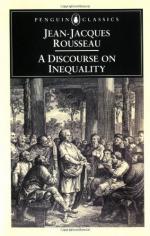
|
| Name: _________________________ | Period: ___________________ |
This test consists of 15 multiple choice questions and 5 short answer questions.
Multiple Choice Questions
1. What does Rousseau believe helped man use nature?
(a) Free will.
(b) Force.
(c) Natural reason.
(d) Instinct.
2. Where does Rousseau believe speech arose from?
(a) Out of necessity.
(b) The property phenomenon.
(c) Between dad and child.
(d) Between mom and child.
3. What would make property rights equal?
(a) New government.
(b) New leadership.
(c) War.
(d) If human talents were equal.
4. According to Rousseau, what do men have that is difficult to control?
(a) Desire.
(b) Anger.
(c) Intelligence.
(d) Instincts.
5. What leads to sex for man, according to Rousseau?
(a) Natural sentiment.
(b) Love.
(c) Carnal desire.
(d) Lust.
6. According to Rousseau, who destroyed human compassion?
(a) Power.
(b) Greed.
(c) Desire.
(d) Modern depravity.
7. What can society no longer exist on after luxury is introduced, according to Rousseau?
(a) Crops.
(b) Peaceful existence.
(c) Private income.
(d) Plants and acorns.
8. What does natural inequality produce, according to Rousseau?
(a) Personal inequality.
(b) State inequalitry.
(c) National inequliaty.
(d) Economic inequality.
9. According to Rousseau, what does moral inequality clash with?
(a) Natural right.
(b) Human rights.
(c) Human law.
(d) Natural law.
10. What is a natural virtue considered to be, according to Rousseau?
(a) Virtue.
(b) Compassion.
(c) Desire.
(d) Love.
11. What is the final stage of maturation of inequality, according to "Chapter 5, A Discourse on the Origin of Inequality, Part Two"?
(a) Despotism.
(b) Ego.
(c) Talent.
(d) Desire.
12. According to Rousseau, what is the savage man of nature focused on?
(a) Self knowledge.
(b) Survival.
(c) Self preservation.
(d) Arts and sciences.
13. What does Rousseau believe does not preserve one's liberty?
(a) Using one's liberty.
(b) Laughing at one's liberty.
(c) Ignoring one's liberty.
(d) Alienation of one's liberty.
14. What was man's second feeling, according to Rousseau?
(a) His breath.
(b) His existence.
(c) Self preservation.
(d) Crying.
15. What was man's first feeling, according to Rousseau?
(a) His breath.
(b) Self preservation.
(c) His existense.
(d) Crying.
Short Answer Questions
1. What does Rousseau say separates the sensation of the savage from simple knowledge?
2. What does "A Discourse on Inequality" of Rousseau's focus on aside from morality?
3. When does Rousseau believe inequality came?
4. What do men have that can be combined, according to Rousseau?
5. What is human understanding rooted in, according to Rousseau?
|
This section contains 364 words (approx. 2 pages at 300 words per page) |

|




